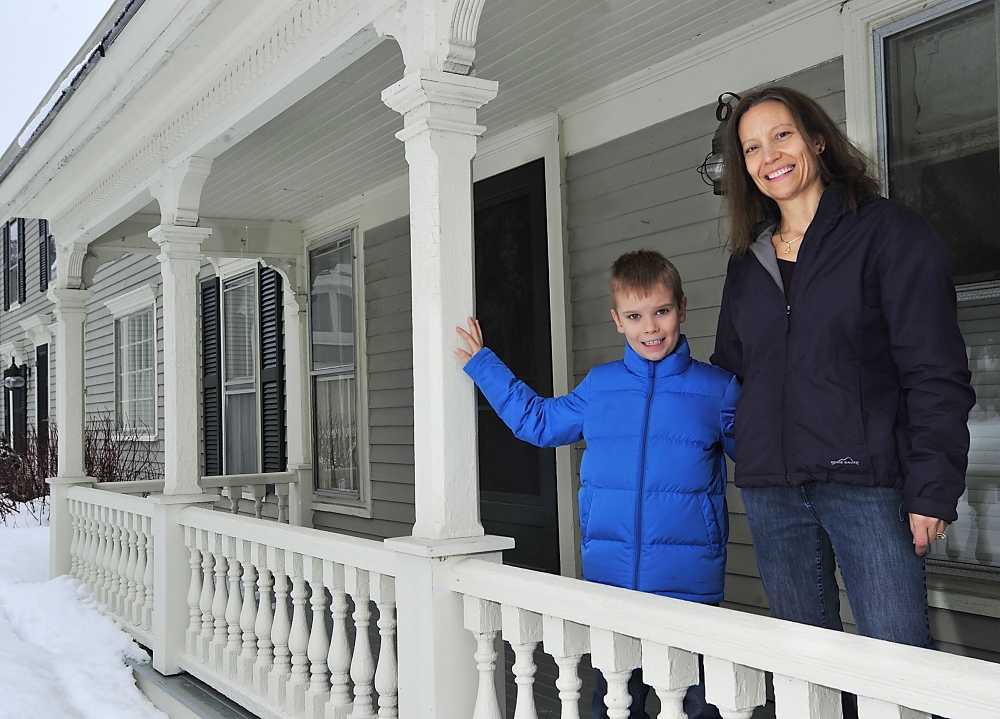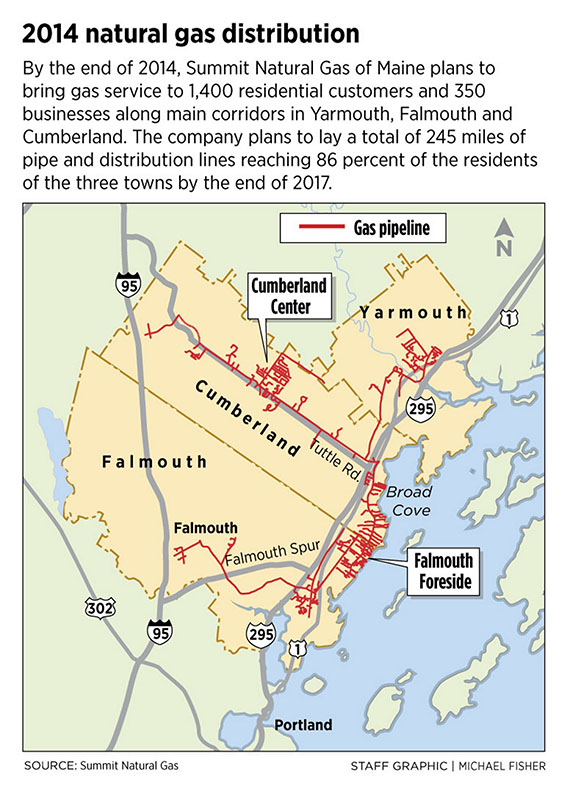CUMBERLAND — Summit Natural Gas of Maine is preparing to break ground in the coming months on a massive project to connect thousands of homes and businesses in Cumberland, Yarmouth and Falmouth to natural gas.
And customers are quickly getting in line for service.
Those signing up to convert to gas include the local school district and homeowners such as Susan Smith, who expects to save $1,000 per winter on heating her family’s 1840s farmhouse. “We jumped on it,” Smith said.
The company is expected to receive final approval for the project from the Maine Public Utilities Commission in the coming weeks. Sales teams have already hit the streets and are working the phones to sign up households and businesses along key routes in the three towns. A wider campaign, including television, radio, print and direct mail marketing, will be rolled out in March in support of the $72.5 million construction project.
So far, more than 250 households and 25 businesses have signed up. By the end of 2014, Summit projects it will capture 1,400 home customers and about 350 businesses in the area.
“This part of the state is encircled with natural gas,” said Mike Duguay, director of business development for Summit and former planning director for the city of Augusta. “(Cumberland, Yarmouth and Falmouth) have been the hole in the doughnut, so to speak. These people have been waiting for it for a long time, understanding the benefits of what their friends have experienced.”
If all goes according to plan, over the next five years Summit could become the second-largest supplier of natural gas in the state, poised to reach a total of more than 22,000 customers – with roughly 7,600 in the Portland suburbs and 15,000 in the Kennebec Valley, where a $350 million expansion project already underway stretches from Pittston to Madison.
If Summit meets all of its goals, it will be second in reach only to Unitil, which serves 28,750 natural gas customers between the southerly Maine-New Hampshire border and the Lewiston-Auburn area.
Natural gas has increasingly appealed to property-owners grappling with spikes in the cost of fuel oil and propane, especially after this heating season’s particularly harsh conditions.
Summit plans to have gas flowing to the first institutional and business customers in the suburban towns by September, including the three schools in Cumberland, with residential customers scheduled to come on line by December, according to the company. Municipalities have begun mailing information sheets to residents with transmission maps showing the annual plans to build out the system.
In the summer, the towns are planning to hold energy fairs, at which residents can hear Summit pitch its product first-hand and learn about subsidies the utility is offering for conversion costs. Shovels will hit dirt as early as April, with the bulk of construction set to begin in May and continue until the frost arrives.
Duguay said the company plans to introduce a $1,500 rebate for people who must replace a boiler, and $375 to replace a burner. Overall, depending on what heating systems are currently in use, residents can expect to pay between $2,000 and $7,000 – or in some cases more – to convert their systems, said Bill Shane, Cumberland’s town manager and a close follower of the project.
Summit was chosen in a competitive bidding process by the three suburban towns. Municipal officials are working closely with the utility, and have largely embraced the aggressive project, which will require crews to lay 245 miles of pipe and distribution lines by 2017. Construction will start first along three main corridors that lead from the Maritimes & Northeast Pipeline to the west, to the three population centers. Construction will be heaviest along Blanchard and Tuttle roads, and routes 1 and 88.
By the end of 2017, Summit plans to have connected more than 7,600 customers in Falmouth, Cumberland and Yarmouth.
The company’s rapid expansion has brought some growing pains.
In the Kennebec Valley, the contractor employed by Summit to construct the steel pipeline into the Augusta area, Schmid Pipeline Construction of Mayville, Wis., sued the utility in December in federal court, alleging $72 million in damages for underestimating the scope of work and not increasing payments so the contractor could hire more workers and extend work hours on the job.
Summit was also 10 weeks late delivering gas service to municipal buildings in Augusta.
Duguay said he could not comment on the ongoing legal proceedings. He said the company has learned from its experiences in the Kennebec Valley and will do its best to ensure that it has the construction resources in place once digging begins. What the company cannot control, and what is always an unknown in projects such as these, are weather and geology, Duguay said.
“In the end, it’s a little bit of an orchestration of assets,” Duguay said.
Still, Summit has been embraced by the three communities as it prepares to introduce gas lines.
For instance, in Cumberland, where the three schools in School Administrative District 51 are heated by fuel oil, heating costs this year will top $408,000, said Scott Poulin, business manager for the district. Between last school year and this school year, the per-gallon cost of fuel oil for the district has spiked 10 percent, to $2.19. Once converted to natural gas, the district believes it will recoup the cost to change over within the first year, for a total savings of roughly $163,000 annually, Poulin said.
He said Summit hopes to bring the schools on line by Sept. 1 after doing conversion work during the summer, a timeline possible because the three schools in Cumberland Center are relatively close together and only about two miles from the main transmission line.
Homeowners are getting in on the savings, too.
Susan Smith moved to Cumberland Center with her husband and son in July, and during the course of renovating their 1840s farmhouse, decided to make a sizable investment in heating equipment so the family would be among the first connected to the new gas system.
In the meantime, her home is heated by propane, which is a simpler conversion than from oil or other fuel sources.
“We jumped on it,” said Smith, who lived most recently outside of Chicago in Lake Villa, Ill. When a representative from Summit arrived to assess the family’s potential savings, Smith was candid. Even with a new heating system running on propane, the introduction of natural gas will still save them $1,000 per season.
“I told her I’m not a tough sell,” Smith said. “We were eager to be at the top of the list for hookups.”
Matt Byrne can be contacted at 791-6303 or at:
Twitter: MattByrnePPH
Send questions/comments to the editors.





Success. Please wait for the page to reload. If the page does not reload within 5 seconds, please refresh the page.
Enter your email and password to access comments.
Hi, to comment on stories you must . This profile is in addition to your subscription and website login.
Already have a commenting profile? .
Invalid username/password.
Please check your email to confirm and complete your registration.
Only subscribers are eligible to post comments. Please subscribe or login first for digital access. Here’s why.
Use the form below to reset your password. When you've submitted your account email, we will send an email with a reset code.